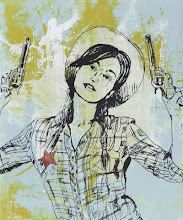Extracting the tongue from the cheek, whilst I realise not all gents devote the time they don't spend removing hair etc to reading improving literature, could it not be fair to say that some ladies really do lose out on free time which is earmarked for 'beautifying'?
Tuesday, 6 April 2010
To pluck or not to pluck...?
In the same vein, here is a wee story of a conversation I had last summer with a very good friend of mine on a camping holiday. We were walking back from the village chatting about our school days and the stuff we had learned (and forgotten) and about general knowledge - how you get it, how to keep it and how useful it actually is! "It's funny", my friend said, "but when I think of the people I know, the guys tend to have more general knowledge than the gals... Why do you think that is?" Now I don't know if this is even true and there may be many reasons why if it is, but just at that moment we were walking back into our campsite, past the tent of a young Italian couple in their early twenties, on holiday, sitting outside in the sun. He was reading a book, she was ... plucking her bikini line. With my tongue firmly in my cheek I said: "Well there's your answer: by the time she's finished plucking her bikini line, he'll be one book ahead. And if she starts all over again once it's grown back in a few weeks' time, he'll be two books ahead, and so it goes on!"
Subscribe to:
Post Comments (Atom)

The conversation made me smile, though I don't agree. At least not that the reason some women are less well-informed about general events is thanks to their beauty regime. It's probably got more to do with a general lack of interest in events concerning totally unknown people. I think that women (and I am totally generalizing here)are more interested in things that happen to people they know - at least vaguely. And as far as reading goes: from what I've seen, more women list reading as a hobby than men. The latter, however, tend to read the newspaper more - hence increased general knowledge.
ReplyDeleteHeh heh, I'm glad to have brought a wee smirk to your lips :o) Perhaps I didn't express my final paragraph very well. I wouldn't make a correlation between less general knowledge and more time beautifying either. Rather, I wonder if time spent beautifying could be spent doing any number of other things: riding a horse, reading a manga, doing an assault course, eating cake. You name it! It's a more general theory, if you see what I mean.
ReplyDeleteAs to your other point, hmm, I wonder how true that is. I think I'll have to think about it more before I can say if the people round me seem to fit in with that idea. Maybe so, true enough. There is some research (although I always take these things with a pinch of salt) that does indeed suggest that women are more interested in / good at building communities of people they know. Having said that, I read the paper! The fact that it goes in one ear and out the other is a different issue... ;o) Could it be the case that newspapers somehow don't appeal to a lot of women?? I am always loath to create big giant categories of people as if they were all the same, but it's an interesting thought nonetheless. Let me trawl the web and see what I can find.
Having said the above, I also realise that beautyfing can be fun for some people and they'd rather do that than eat cake (not me! ;o)). I guess I just wonder how much real "choice" there is in many cases, but that is a whole nother philosophical debate (smells funny round here, did someone just open a can of worms??)
ReplyDeleteOn general knowledge: it is, more or less by definition, a function of the public (general) sphere, which for complex historical reasons has been - and to a large extent still is - a male-dominated sphere. Women's sphere has been historically the private (particular) sphere, and the knowledge they have generated (have been encouraged to generate) relates more to that. But since it is specific it's difficult to mobilise in any kind of "competitive" way (could never have a quiz about it!), and competition is also a feature of the male public sphere.
ReplyDelete